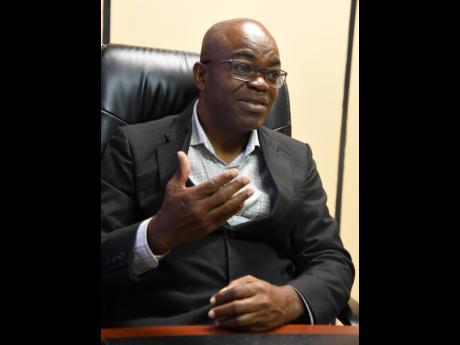NEPA’s new CEO charts course for environmental protection
... pledges collaboration, research to boost efficiency
Leonard Francis, the new chief executive officer (CEO) of the National Environment and Planning Agency (NEPA), says the entity will be fostering a culture of collaboration and research to further its mandate of sustainable environmental protection under his leadership.
Francis, who assumed the helm of the state agency on April 2, told The Gleaner that his first order of business was to strengthen engagement with key partners. These, he said, included the Jamaica Constabulary Force, the various municipal corporations, the Ministry of Local Government and Community Development, and the Social Development Commission.
“We’re actually writing them to say, ‘Listen, we’d like you to share your database of all the citizen groups you have in Jamaica, so we’re now gonna compare that to our list, and we’ll be reaching out to these groups,” he said.
Fundamental to his approach, he explained, will be seeking the buy-in of citizens, who Francis envisions as NEPA’s “eyes and ears”, in the agency’s bid to protect the environment, through targeted public education campaigns.
“I know it’s a lot of work, but we are convinced that it needs to be done and we’re convinced that the general public will participate … . They are the ones that have been saying that we’re not doing enough, so it’s now time for all of us to play our part,” he said.
“We want them to understand that NEPA is a partner with them, and we want them to help us in enforcing and monitoring on the ground. There’s no way whatsoever that we’ll have a NEPA officer at every door; we can’t have a NEPA officer in every community,” Francis stated.
Currently, NEPA has 23 enforcement officers spread across its four regions as it oversees the country’s environmental protection, natural resource management, land use, and spatial planning.
Restructuring process
Its director of the Legal and Enforcement Division, Neidene Robinson, said the agency is currently undergoing a restructuring process and is seeking approval from the Ministry of Finance for an additional 12 enforcement officers.
“There would be greater efficiency and we would become a bit more effective in carrying out our duties,” she contends if approval is granted.
While acknowledging that NEPA does not have enough enforcement officers and has been critiqued for how this limitation hampers its ability to effectively monitor [projects and issues], Francis noted that the technical staff at the agency can help with enforcement.
He also expressed a desire to revisit the district constable programme, where enforcement officers are trained to perform such duties.
“We’re also thinking if it’s possible for some of them to undergo training at the police training school as well in the aspects that will be relevant to us,” he said.
In addressing criticism of NEPA’s lack of alacrity in addressing environmental issues such as fish kills, Francis said will be working on a research-driven solution.
This will involve gathering data on every pollution incident that has happened in Jamaica over the last 10 years; the locations, frequency, impact and time. He said this information will be garnered from its internal database, but also from external groups.
After the data is collected, Francis explained a software will be used to categorise the information, thereby creating a predictive model, with a “very low standard of error”.
“The model will give us an idea of the time of day, what the conditions are, tell you what the temperatures are, … so when the time of year is coming up, we can just put the resources in those areas,” he said. “So if, for argument’s sake, we are there monitoring and the incident happens another time, think about what that will be telling you ... . That is not a natural phenomenon; it could be that is is deliberate as well.”
He did not give a timeline for when the research will commence, but noted that NEPA is in the process of gathering data and formulating questionnaires for distribution to stakeholders.
Additionally, Francis said the agency will be utilising more technology in its monitoring, sharing that it currently has four drones, one for each of its regions, and is exploring how it can utilise real-time satellite imagery to monitor environment things.
Another area that Francis said he will be tackling is the agency’s role in overseeing the country’s landfills. He noted that NEPA has started the research and is looking at proposals on how to better its surveillance of landfills, sharing that it is currently having discussions with the enterprise team that is reviewing operations at the Riverton landfill in St Andrew.
He outlined that he will be pushing for the possibility of convincing the people who labour on these landfills to rally their help in its monitoring.

